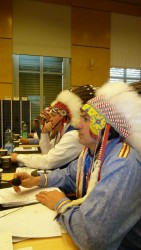Article Origin
Volume
Issue
Year
The voice of the United Nations has been added to that of First Nations Chiefs in urging Alberta and Canada to start implementing the treaties and to follow the 46 articles in the UN’s Declaration on the Rights of Indigenous Peoples, which was adopted by Canada in 2010.
In March, the UN’s Committee on the Elimination of Racial Discrimination presented its observations stating Canada wasn’t doing enough to “realize the economic, social and cultural rights of Aboriginal peoples” and “implement in good faith the right to consultation and to free, prior and informed consent of Aboriginal peoples whenever their rights may be affected by projects carried out on their lands.”
“I felt very strongly the UN heard our voice, they were impartial, and they need to know the plight of the Treaty Indian people, Aboriginal people in this country,” said Treaty 6 Grand Chief Cameron Alexis, who was part of a First Nations delegation which included Onion Lake Chief Wallace Fox and Ermineskin band councillor Gordon Lee.
They presented an alternative report to CERD in Geneva in February on behalf of the International Indian Treaty Council, Confederacy of Treaty 6 First Nations, Samson Cree Nation, Ermineskin Cree Nation, the First Nations Summit, Dene Nation and Assembly of First Nations Regional Office (Northwest Territories), Assembly of First Nations, Union of British Columbia Indian Chiefs, Native Women’s Association of Canada, Indigenous World Association, and Treaty 4 First Nations.
“I felt very obligated to speak at this level and I felt that I had to. I’m very thankful that the UN embraced us and I was very thankful the committees embraced us and listened to us rather than just listening to Canada, telling the UN and the world how great they’re doing with respect to the Aboriginal people in Canada,” said Alexis.
“All of the concerns enumerated in this Alternative Report represent a failure of Canada to implement the UN Declaration in good faith and in conjunction with Indigenous Peoples,” states the written presentation. “As Indigenous Peoples, we face exclusion, restriction and distinction based on our Indigenous identity not only “on occasion” but in our daily lives – we experience the full impact and effect of discrimination as individuals and as collective nations, Peoples, tribes and communities.”
CERD made it clear in its observations that Canada has much to do to honour the treaties, said Alexis. CERD told the Canadian government that saying the government had policies and legislation in place that supported education, health, and economic development for the Aboriginal people wasn’t good enough.
“(CERD said) show us that you are without doubt committed to doing these types of things,” said Alexis.
One of the recommendations made by CERD is to “continue to seek in good faith agreements with Aboriginal peoples with regard to their lands and resources claims under culturally-sensitive judicial procedures, find means and ways to establish titles over their lands, and respect their treaty rights.”
While the UN cannot force the Canadian government to take steps, the UN has “the power to influence at the international level,” said Alexis.
The delegation has been invited back to Geneva for early July in relation to “Indigenous issues across the globe,” he added.
Photo caption: Treaty 6 Grand Chief Cameron Alexis (left) with Little Black Bear First Nation Chief Perry Bellegarde at the UN in Geneva.
- 2489 views

